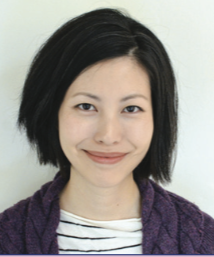By Mark Bailey (entering class of 2013)
Alice Huang is an Assistant Professor in the Department of Orthopaedics and is part of the DTE and DSCB MTAs. Her lab’s website is: http://labs.icahn.mssm.edu/huanglab/
 Where are you from originally?
Where are you from originally?
I grew up in California, and then went to undergrad at Barnard and Columbia Engineering. After that, I did my PhD at Penn and moved to Portland for my postdoc and now I’m here!
What are your research interests?
I was a bioengineer by training, but I first got into orthopedics after college when I was at the Hospital for Special Surgery as a research technician, working on treatments for osteogenesis imperfecta. At Penn I was doing cartilage tissue engineering, but by the end of my PhD, felt that we had hit a wall with what we can achieve in our ability to make replacement tissues. And I felt that we needed to understand how tissues develop normally before we can recapitulate that in vitro. So for my postdoc I really wanted to do something in developmental biology. I started looking around for developmental biology labs and by luck I stumbled into the lab of Ronen Schweitzer who is one of a very small handful of people studying tendon development. And I say lucky, because it is in many ways an emerging field, and there is little known about tendon, especially compared to the skeleton or muscle. When it came time to establish my own lab, I decided to distinguish myself from the work of my advisor by focusing on tendon injury and regeneration, using mouse mutants that have been implicated in tendon development. Since there are no congenital diseases that we know of where tendon development is impaired, tendon research is primarily from the standpoint of injury or repair. And there are something like 100 million cases of tendon injury in the US so it is an important field of study. Despite this, there are still an astonishing number of unknowns in tendon biology, and I hope we can shed some light into that in the coming years.
How did you end up coming to Sinai?
The orthopedic department here started recruiting me about a year into my postdoc. Relative to some other fields, the orthopedic research community is fairly small, and having been in the field for a long time, I had formed a large and supportive network even as a graduate student. By doing something so different from my postdoc, I managed to catch Sinai’s interest and the department noticed the work I was doing. And because there are so few tendon biologists, they were very interested. It’s been an excellent match for me and my research, and my colleagues and the environment have been very supportive.
How did you get into orthopaedics?
It probably emerged from an interest in mechanobiology. The first lab I ever worked at belonged to Kevin Costa, who is now here at Sinai. That was when I learned to build bioreactors and was first exposed to the concept that mechanical forces can affect cell fate and organization. I’m not sure how I made the transition from cardiac tissues to orthopedics but mechanbiology has been a consistent interest and it obviously plays a critical role in many aspects of orthopaedic tissue development, homeostasis, and repair.
Do you have any advice for young scientists choosing a mentor?
I’ve been very lucky in the people I have trained with and I would say to trust your gut instinct. When choosing both my PhD and postdoc advisors, I felt a strong connection during the interview and felt we would work and communicate well together. Obviously the other pieces have to be in place (resources, environment, etc), but don’t over-think it.
What are some projects that potential students could take part in? Absolutely! One of the things we are interested in is neonatal regeneration and to see how that differs from adult healing which is largely regulated by fibrosis. We have preliminary data suggesting that there may be some activation of stem cells in the neonatal scenario that may not be recapitulated in adults. One of the major pathways we are investigating is the TGFβ pathway and we are looking to perturb downstream mediators to understand the mechanisms regulating fibrosis vs tenogenic differentiation.
Outside of lab, what are your interests?
What do you do for fun? Before I moved in with my fiancé I had many more hobbies. Partly because I moved back to New York, I had to downsize. Now I am at the point where probably my main hobby is knitting socks once winter comes.
What are your favorite places to eat in NYC?
That is a really hard question! There is a list published in NYT about the top ten ramen places. I loved ramen in Portland, I haven’t tried as many places here as I’d like but am open to all recommendations.
